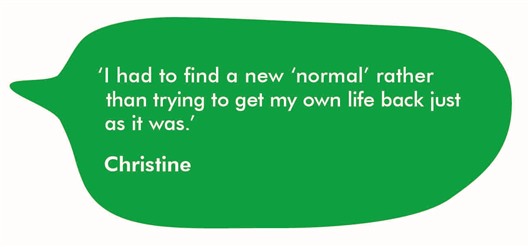Having a family member who has survived cancer, I understand that sometimes coming out the other side doesn’t always mean getting your old life back straight away. It can be a lot more challenging than that. You will most likely feel relieved when your treatment is over. You’ll probably be keen to get back to everyday life. But you may still have treatment side effects and be coping with mixed feelings. It’s often a time of change and finding out what’s now normal for you. It can take anything from a few weeks to a few months to readjust, and it’s important to remember that this varies from person to person.
In this blog, we’ll offer some advice and support on preparing for life after cancer treatment.
Your care after treatment
How often you see your cancer team for check-ups after treatment depends on the type of cancer you had, its treatment and your situation. Most people have check-ups quite often in the first year. After that, the appointments usually get less frequent for a few years.
Some people have check-ups over the phone with a specialist nurse instead of going to a clinic. Towards the end of your treatment someone will talk to you about follow-up and how to contact the hospital if you need to.
If you’re having ongoing treatment (hormonal therapy or maintenance treatment) you may have to keep going to the hospital. Some people have this treatment prescribed by their GP.

Lifestyle and well-being
One positive step you can take after cancer treatment is to think about some healthy lifestyle changes you could make. Here are just some of the things you could think about:
Now that your treatment is over, you may experience some of the following feelings. Many of these will lessen over time.
Feeling alone
There are lots of different ways you can get support. Support groups or online social networks mean you can talk to people who’ve been through a similar experience and find out what’s helped them. You can also talk to one of our cancer support specialists on 0808 808 00 00.
Uncertainty
Cancer can take away your sense of security and control. This can be very frightening. Getting on with the things that you can control may help. You could organise your own day, do things you enjoy, get involved in your own care and make the most of your health.
Anger
It’s natural to feel angry when you’ve had cancer. Try to talk to people about how you feel. It may help to explain that you’re angry at the illness and not at them. Finding ways to help you relax and reduce stress can also help.
Sadness or depression
Usually, feelings of sadness, anxiety or anger lessen over time. If they don’t get better, you might need more support.
After my auntie’s treatment, I know that she found fundraising a great way to keep herself busy and keep a lot of these feelings at bay (it was also a great excuse to eat lots of cake at the Coffee Morning she organised!) She felt an enormous sense of well-being and satisfaction from giving something back.
This blog answers just a small range of the questions you have might have about the emotional and practical issues of life after having cancer treatment. Our booklets Life after cancer treatment and Your feelings after cancer treatment have lots more information on recovery, relationships and returning to work. We also have tips on coping with physical changes, including body image concerns after cancer.
To see what else Macmillan's cancer information team has been blogging about, please visit our blog home page! You can subscribe to receive our blogs by email or RSS too.
We're with you every step of the way
The Macmillan team is here to help. Our cancer support specialists can answer your questions, offer support, or simply listen if you need a chat. Call us free on 0808 808 00 00.
Comments? Feel free to add them below (you need to be logged in).
Keep in touch Follow Macmillan’s cancer information team on Twitter @mac_cancerinfo
Whatever cancer throws your way, we’re right there with you.
We’re here to provide physical, financial and emotional support.
© Macmillan Cancer Support 2026 © Macmillan Cancer Support, registered charity in England and Wales (261017), Scotland (SC039907) and the Isle of Man (604). Also operating in Northern Ireland. A company limited by guarantee, registered in England and Wales company number 2400969. Isle of Man company number 4694F. Registered office: 3rd Floor, Bronze Building, The Forge, 105 Sumner Street, London, SE1 9HZ. VAT no: 668265007